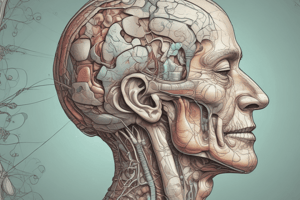Podcast
Questions and Answers
What is bromocriptine (Parlodel) used to treat?
What is bromocriptine (Parlodel) used to treat?
Prolactinoma and Parkinson's disease
Which medications are older H1 antagonists? (Select all that apply)
Which medications are older H1 antagonists? (Select all that apply)
- Hydroxyzine (Atarax) (correct)
- Meclizine (Bonine) (correct)
- Cyproheptadine (Periactin) (correct)
- Diphenhydramine (Benadryl) (correct)
What medication would you expect Mrs. M to receive for acute serotonin syndrome?
What medication would you expect Mrs. M to receive for acute serotonin syndrome?
Cyproheptadine (Periactin)
Which of the following describes prostaglandins? (Select all that apply)
Which of the following describes prostaglandins? (Select all that apply)
What are serotonin agonists for migraines?
What are serotonin agonists for migraines?
Which of the following statements about histamine is correct?
Which of the following statements about histamine is correct?
Which medication would Mr. C expect to receive for degenerative joint disease?
Which medication would Mr. C expect to receive for degenerative joint disease?
What is serotonin?
What is serotonin?
What impact do ergot alkaloids have?
What impact do ergot alkaloids have?
What risk do NSAIDs increase?
What risk do NSAIDs increase?
What are H2 antagonists?
What are H2 antagonists?
Which of the following describes ergot alkaloids? (Select all that apply)
Which of the following describes ergot alkaloids? (Select all that apply)
What are ibuprofen (Advil), naproxen (Naprosyn), and celecoxib (Celebrex)?
What are ibuprofen (Advil), naproxen (Naprosyn), and celecoxib (Celebrex)?
What are ergotamine (Cafergot), bromocriptine (Parlodel), and methylergonovine (Methergine)?
What are ergotamine (Cafergot), bromocriptine (Parlodel), and methylergonovine (Methergine)?
Which of the following OTC prostaglandin inhibitors is an NSAID?
Which of the following OTC prostaglandin inhibitors is an NSAID?
Which class of medication contributes to acute serotonin syndrome?
Which class of medication contributes to acute serotonin syndrome?
What medication would Mrs. B receive for acute dystonic reaction?
What medication would Mrs. B receive for acute dystonic reaction?
What medication would Mrs. V receive for migraine headaches?
What medication would Mrs. V receive for migraine headaches?
What are newer H1 antagonists?
What are newer H1 antagonists?
What is acetaminophen (Tylenol)?
What is acetaminophen (Tylenol)?
Which drug is a leukotriene antagonist?
Which drug is a leukotriene antagonist?
What is Barrett's Esophagitis?
What is Barrett's Esophagitis?
What is Zollinger-Ellison (ZE) syndrome?
What is Zollinger-Ellison (ZE) syndrome?
Which of the following is a bronchodilator? (Select all that apply)
Which of the following is a bronchodilator? (Select all that apply)
Which antiemetics can cause acute dystonic reactions?
Which antiemetics can cause acute dystonic reactions?
What class of medications do cimetidine (Tagamet), famotidine (Pepcid), nizatidine (Axid), and ranitidine (Zantac) fall into?
What class of medications do cimetidine (Tagamet), famotidine (Pepcid), nizatidine (Axid), and ranitidine (Zantac) fall into?
Flashcards are hidden until you start studying
Study Notes
Parkinson's Disease
- Bromocriptine (Parlodel) is an ergotamine dopamine receptor agonist.
- Used primarily to treat prolactinoma and manage symptoms of Parkinson's disease.
Older H1 Antagonists
- Hydroxyzine (Atarax), Meclizine (Bonine), Cyproheptadine (Periactin), and Diphenhydramine (Benadryl) are classified as older H1 antagonists.
- Primarily used for allergic reactions and nausea.
Cyproheptadine (Periactin)
- Utilized for treating acute serotonin syndrome.
- Acts as an antihistamine with serotonin antagonist properties.
Prostaglandins
- Mediate various physiological functions including pain, inflammation, gastric protection, and closure of ductus arteriosus.
- Significant role in various inflammatory processes and pain modulation.
Serotonin Agonists for Migraines
- Naratriptan (Amerge), Almotriptan (Axert), Zolmitriptan (Zomig), Rizatriptan (Maxalt), and Eletriptan (Relpax) are used for treating migraine headaches.
- These medications specifically target serotonin receptors to alleviate symptoms.
Histamine Functions
- Acts as a neurotransmitter in gastric acid secretion and mediates allergic reactions.
- Also responsible for symptoms in scombroid poisoning infections.
Celecoxib (Celebrex)
- Common medication prescribed for managing inflammation and pain associated with degenerative joint disease.
- A selective COX-2 inhibitor that reduces gastrointestinal side effects compared to traditional NSAIDs.
Serotonin
- Functions as both a vasoconstrictor released by platelets and a neurotransmitter involved in mood regulation.
- Plays a crucial role in various physiological and psychological processes.
Ergot Alkaloids
- Have influenced societal beliefs regarding satanism and witchcraft historically.
- Derived from fungi and have applications in various medical treatments, especially for migraines.
NSAIDs Risks
- Nonsteroidal anti-inflammatory drugs are associated with an increased risk of peptic ulcer disease and bleeding.
- Patients using NSAIDs should be monitored for gastrointestinal complications.
H2 Antagonists
- Cimetidine (Tagamet), Famotidine (Pepcid), Nizatidine (Axid), and Ranitidine (Zantac) are examples of H2 blockers.
- Used to reduce gastric acid secretion and treat conditions like GERD.
Ergot Alkaloids Overview
- Effective in treating migraines and Parkinson’s disease.
- Include medications like ergotamine and bromocriptine, highlighting their dual therapeutic roles.
Prostaglandin Synthesis Inhibitors
- Ibuprofen (Advil, Motrin), Naproxen (Naprosyn, Aleve), and Celecoxib (Celebrex) are classified as NSAIDs and inhibit prostaglandin synthesis.
- Important for pain relief and inflammation management.
Ergotamine
- This medication belongs to the category of ergot alkaloids.
- Effective in treating migraine and managing certain obstetric conditions.
Acetaminophen and NSAIDs
- Naproxen (Aleve) is identified as an NSAID, while Acetaminophen (Tylenol) is a non-NSAID pain reliever.
- They both serve different roles in pain management and inflammation.
Acute Serotonin Syndrome Medications
- MAO inhibitors, serotonin reuptake inhibitors, and triptans can contribute to serotonin syndrome.
- Awareness and careful management are crucial in treating patients at risk.
Diphenhydramine (Benadryl)
- Administered for acute dystonic reactions caused by neuroleptic drug therapy.
- Functions as an antihistamine that also alleviates such side effects.
Sumatriptan (Immitrex)
- Commonly prescribed medication for treating migraine headaches.
- Acts as a specific agonist for serotonin receptors to mitigate migraine symptoms.
Newer H1 Antagonists
- Fexofenadine (Allegra), Loratadine (Claritin), and Cetirizine (Zyrtec) are categorized as newer H1 antagonists.
- Used mostly for allergy relief with fewer side effects than older H1 antagonists.
Acetaminophen (Tylenol)
- Functions as a non-opioid analgesic and antipyretic.
- Not classified as an NSAID despite being a common pain reliever.
Montelukast (Singulair)
- Identified as a leukotriene antagonist.
- Used primarily for asthma management and allergic rhinitis.
Barrett's Esophagitis
- A precancerous change resulting from chronic gastroesophageal reflux disease (GERD).
- Associated with long-term damage to the esophagus due to stomach acid.
Zollinger-Ellison Syndrome
- Caused by tumors of the pancreas that secrete gastrin, leading to excessive gastric acid production.
- Results in severe gastric and duodenal ulcers, increasing patient morbidity.
Bronchodilators
- Include Albuterol (Proventil, Ventolin), Salmeterol (Serevent), and Ipratropium (Atrovent).
- Utilized in treating asthma and other obstructive airway diseases.
Prochlorperazine (Compazine)
- An antiemetic that can lead to acute dystonic reactions.
- Requires careful monitoring when prescribed, especially in patients taking antipsychotics.
H2 Blockers
- Cimetidine (Tagamet), Famotidine (Pepcid), Nizatidine (Axid), and Ranitidine (Zantac) are part of the H2 antihistamine class.
- Important in managing conditions related to excessive stomach acid.
Studying That Suits You
Use AI to generate personalized quizzes and flashcards to suit your learning preferences.




